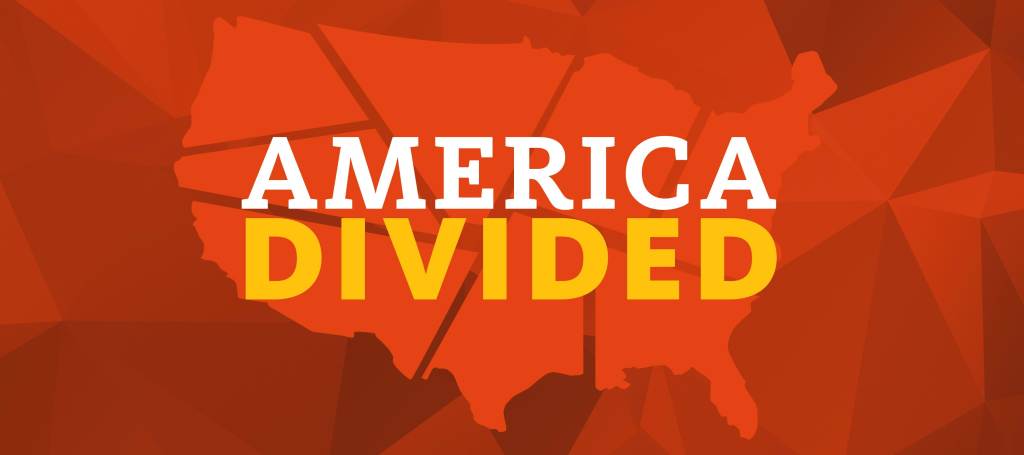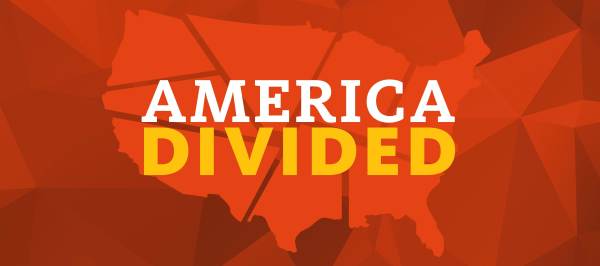
Each week, the Ford Foundation has been recapping the latest episode of America Divided—a docu-series about rising inequality in the United States. You can watch America Divided on Friday nights at 9 pm EST on EPIX and read last week’s episode recap here.
In tonight’s final episode, actress and comedian Amy Poehler follows domestic workers and caregivers in California as they fight for the state’s Domestic Workers Bill of Rights. We also follow up with Zach Galifianakis as he examines how voter suppression and racial gerrymandering are challenging democracy in North Carolina.
Fighting for the dignity and rights of domestic workers
Tonight’s episode starts with a clip of Amy Poehler speaking at the Time 100 gala in 2011. In her speech, Poehler talks about the people who have influenced her most, and ends up paying tribute to her children’s nannies:
“Since I have been at this dinner in 2008, I have given birth to two boys and I’ve left Saturday Night Live and I started my own TV show, and it’s been a crazy couple of years, and I thought who besides Madam Secretary Clinton and Lorne Michaels have influenced me? And it was the women who helped me take care of my children. It is Jackie Johnson from Trinidad and it is Dawa Chodon from Tibet, who come to my house and help me raise my children. And for you working women who are out there tonight who get to do what you get to do because there are wonderful people who help you at home, I would like to take a moment to thank those people, some of whom are watching their children right now, while you’re at this event. Those are people who love your children as much as you do, and who inspire them and influence them… [So] on behalf of every sister and mother and person who stands in your kitchen and helps you love your child, I say thank you and I celebrate you tonight.”
Poehler’s comments about her nannies capture the reality of many American households today. The US has become a country of two-earner households, and 40 percent of women are their families’ primary breadwinners. As a result, millions of families rely on some kind of professional help inside the home. And with a baby boomer turning 65-years-old every eight seconds, Americans are also increasingly depending on domestic workers and homecare providers to look after their elderly family members.
As Poehler noted, domestic workers should be some of the most influential and well-respected people in the country: They leave their own families every day to work in other people’s homes, caring for other people’s families. Yet many domestic workers do not receive the respect and dignity that they deserve. They are often paid less than the minimum wage, have no guarantee of overtime pay, and are excluded from basic workers’ rights and protections.
Poehler meets with organizers from the Coalition for Humane Immigrant Rights of Los Angeles (CHIRLA) during a critical time in California’s fight for the rights of domestic workers. CHIRLA, along with many other organizations, is advocating for the permanent extension of California’s Domestic Workers Bill of Rights, which guarantees domestic workers overtime pay. Since 2011, the National Domestic Workers Alliance (NDWA), has successfully lead campaigns to pass a bill of rights for domestic workers in seven states. In 2015, the organization’s efforts led to the righting of a historic wrong that explicitly excluded domestic and home care workers from minimum wage and overtime protections under the Fair Labor Standards Act. The result was the extension of these basic rights to over 2 million workers nationwide, guaranteed.
Trying to understand why domestic workers lack basic fundamental rights and protections, Poehler talks to NDWA’s director, Ai-jen Poo, who explains that the root of the injustice lies in America’s legacy of sexism and racism. The US has had a long history of not valuing the work that women do. But the lack of rights and protections for domestic workers can be traced back to the 1930s, when Southern members of Congress refused to support workers’ rights and labor provisions in the New Deal if they applied to domestic workers—who at the time, were largely black. Every domestic worker since then has been living in the shadow of that racial exclusion, Poo says.
Poehler follows CHIRLA, NDWA, and other organizations as they travel to Sacramento to urge state legislators to pass the Domestic Workers Bill of Rights. Despite opposition, support for the bill has proven overwhelming and it was passed in September 2016. But as Poehler points out, one law can only do so much. Many domestic workers are still underpaid and unaware of their rights.
Poehler’s investigation sheds light on our unequal system, where the workers who raise the children and care for the elders of America’s families struggle to feed their own families. Undoubtedly, there is a critical need to improve their wages and working conditions. But the issue of caregiving has an impact far beyond those employed in the sector. Given growing inequality, a rapidly aging population, and the changing configuration of the American household, individuals of all income levels are increasingly struggling to provide high quality, affordable care for their loved ones. Addressing the challenges of intergenerational caregiving, while providing quality wages and working conditions for care sector workers, will benefit everyone.
To build a more just economy, Ford supports a diverse range of grantees in their efforts to raise the minimum wage, ensure paid sick days and parental leave, advance quality affordable child care, and innovate in long term care insurance—interrelated policies that make it possible for people to be responsible family members and productive workers throughout their lives. If we continue to commit to improving the conditions of domestic workers, and low-wage workers across the labor market, we can build a new economy rooted in dignity and care that works for all Americans.
Voter suppression and gerrymandering in North Carolina
Also in tonight’s episode, we pick up with Zach Galifianakis in North Carolina. This week, he goes beyond the problem of money and politics to examine how voter suppression and racial gerrymandering are hurting democracy in the state.
Galifianakis talks to the writer and voting rights expert Ari Berman, who explains that historically, North Carolina had very strong voting protections, and an electoral system that made it easy for citizens to exercise their fundamental democratic right. But over the last few years, Berman says, people in power have created a system that enables them to stay in power. The North Carolina state legislature systematically rolled back voter protections and enacted discriminatory restrictions like the voter ID law.
Unfortunately, what is happening in North Carolina is also happening in other states. In 2013, after the Supreme Court struck down a major section of the Voting Rights Act that protected the rights of voters of color, new voter restrictions meant that thousands were turned away from the polls. When Berman and former US attorney general Eric Holder spoke at the Ford Foundation, they said that short-term voter suppression is the new normal—which is especially disconcerting since 2016 is the first presidential election in 50 years to procede without the full protections of the Voting Rights Act.
Galifianikis also looks into the issue of racial gerrymandering in North Carolina. In 2010, the North Carolina legislature under Republican control began redrawing districts in order to “pack” African Americans and minorities into the same few districts, weakening their overall vote and influence. While political redistricting is legal, redistricting on the basis of race is not. More problematic was the fact that the redistricting process was done by private consultants, rather than officials, removing all transparency from the process.
Fortunately, in the summer of 2016 federal courts struck down North Carolina’s voter ID law and ordered the state to redraw its legislative districts, finding that the state legislature had intentionally acted to suppress the African American vote. But while these are important wins for democracy and civil rights in North Carolina, voting rights continue to be under attack in the state and across the US.


